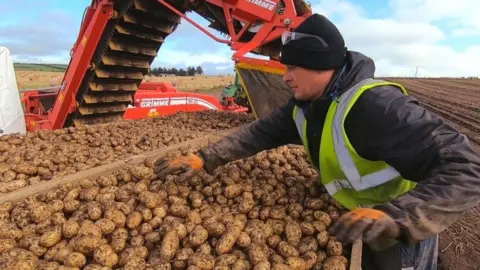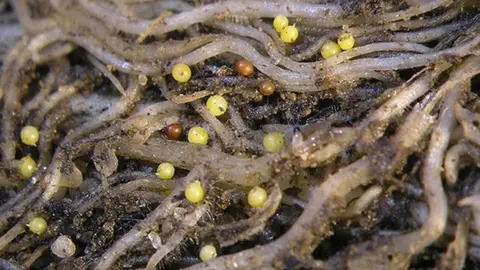Scottish potato industry unites to tackle pest threat
 BBC
BBCFarmers and growers are joining forces to tackle a threat which some fear could wipe out the Scottish potato industry by 2025.
Experts have warned about the potential impact of the spread of potato cyst nematode (PCN).
The amount of land affected in Scotland has been doubling every six or seven years, and researchers fear the pest will cost the industry millions.
It can take 30 years before potatoes can be grown again on infected land.
Jon Pickup of research group Science and Advice for Scottish Agriculture (Sasa) said there had been an "exponential increase" in cases of the pest in Angus, the area worst affected by the pallida species of PCN.
He said: "At the moment we're finding PCN in about 500 hectares per annum, but the exponential spread means that by 2025 this could be at 1,400 to 1,500 hectares.
"With six-year rotations, the management decisions we make now will only change things from 2026 onwards."
He said it was estimated that £5m to £6m of seed potatoes a year could be lost by 2025.
The first meeting took place last week of the Soil Association Scotland-led Rural Innovation Support Service (RISS).
Its aim was to allow industry experts to discuss latest research on PCN and potential control methods.
 RISS
RISSOne of the long-term solutions discussed at the meeting was the need to grow varieties of potato which are resistant to PCN.
However, only two of the top 15 Scottish varieties of seed potatoes which are currently grown are resistant to pallida.
It was warned that issues with demand could also exacerbate the problem.
Kim Davie, from Sasa, said: "There are only a few pallida resistant varieties currently suitable for use as table varieties and the question is how do we get supermarkets to take these resistant varieties.
"It's getting people wanting to buy them and getting companies wanting to sell them."
 USDA Agricultural Research Service
USDA Agricultural Research ServiceIt was suggested at the meeting that more soil sampling should be done to find solutions.
Stuart Wale of SAC Consulting, part of Scotland's Rural College, said that resistant varieties of potatoes were the long-term solution, but the industry was not yet ready and needed to encourage breeders.
And he added: "In the short-term, growers are going to have to look at other control measures."
A steering group of growers and industry representatives will now be formed to take forward the ideas from the meeting.
